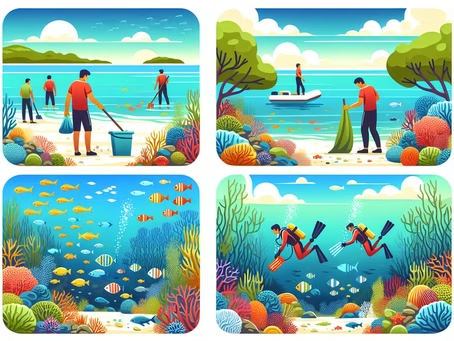Introduction
The ocean is one of Earth’s most vital resources, regulating climate, providing food, and supporting diverse ecosystems. Yet, human activities such as pollution, overfishing, and climate change threaten its delicate balance. The good news is that small, everyday actions can make a real difference. This guide highlights ten simple strategies to help protect and preserve our oceans for generations to come.
Key Takeaways
- Reducing plastic use prevents waste from harming marine ecosystems.
- Choosing sustainable seafood supports biodiversity and responsible fishing practices.
- Conserving water lowers pollution runoff into oceans.
- Reducing your carbon footprint protects reefs and marine habitats.
- Participating in beach cleanups directly removes harmful debris from coastal areas.
10 Simple Ways to Protect Our Oceans
1. Reduce Plastic Use
Plastic pollution is a major threat to marine life. Make small lifestyle changes to cut down on plastic waste:
- Use reusable bags, bottles, and containers.
- Avoid single-use straws, cutlery, and plates.
- Choose recyclable or minimal packaging products.
Every plastic item avoided is one less hazard in the ocean. Collective effort can turn the tide on pollution.
2. Support Sustainable Seafood
Opting for sustainable seafood protects marine ecosystems while ensuring future food security. Look for certifications such as MSC or ASC, buy locally sourced fish, and ask about sourcing when dining out. These choices safeguard biodiversity and promote responsible fishing.
3. Conserve Water
Reducing water waste lessens the pollutants flowing into oceans. Simple actions like fixing leaks, taking shorter showers, and using water-efficient appliances conserve water while helping protect marine ecosystems.
4. Reduce Your Carbon Footprint
Carbon emissions drive climate change and ocean acidification. Make a difference by walking, biking, or using public transport, switching to energy-efficient appliances, and supporting renewable energy. These small shifts help shield marine habitats from climate stress.
5. Participate in Beach Cleanups
Joining cleanup events is a hands-on way to remove waste before it reaches the ocean. Bring gloves and reusable bags, follow local guidelines, and recycle where possible. Cleanups not only improve coastal areas but also raise community awareness.
6. Avoid Chemical Pollutants
Chemicals from household products and pesticides often reach the ocean. Reduce harm by choosing natural cleaning products, practicing eco-friendly gardening, and properly disposing of hazardous waste like paint and oil.
7. Educate Yourself and Others
Knowledge fuels action. Watch documentaries, read books, and follow conservation organizations to stay informed. Sharing insights with friends, family, or online communities can inspire wider support for marine protection.
8. Support Marine Protected Areas
Marine Protected Areas safeguard biodiversity and ensure sustainable fisheries. You can help by visiting responsibly, advocating for stronger protections, donating to conservation groups, and raising awareness about their importance.
9. Use Eco-Friendly Products
Switching to eco-friendly products helps reduce ocean pollution. Choose biodegradable cleaning supplies, avoid microbeads, and carry reusable shopping bags. Small choices add up to major positive impacts on marine health.
10. Advocate for Ocean Policy
Your voice matters in shaping policies that protect the ocean. Stay informed about legislation, support advocacy groups, sign petitions, and vote for leaders committed to marine conservation. Together, collective action can drive meaningful change.
Conclusion
Protecting the ocean doesn’t require monumental effort—just mindful choices in daily life. From reducing plastic waste to supporting sustainable seafood, each action contributes to healthier seas. By adopting these practices and encouraging others to do the same, we can safeguard marine ecosystems and secure a thriving future for our blue planet.
Frequently Asked Questions
Why is reducing plastic important?
Plastic pollution harms marine life, disrupts ecosystems, and takes centuries to decompose.
How do I know seafood is sustainable?
Look for certifications like MSC or ASC, or ask vendors about sourcing practices.
What are easy ways to conserve water?
Fix leaks, use efficient appliances, and turn off taps when not in use.
How does carbon footprint affect the ocean?
High emissions drive warming and acidification, damaging reefs and marine habitats.
How can I join beach cleanups?
Check with local groups, social media, or organizations like Ocean Conservancy for events.

